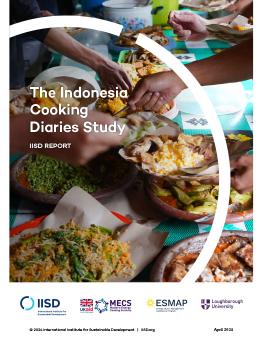
The Indonesia Cooking Diaries Study
This study evaluates the feasibility of switching from liquefied petroleum gas (LPG) stoves to induction stoves in urban Indonesian households, focusing on cooking practices, energy demand, and cost. Using the Cooking Diaries approach, it highlights positive reception, energy efficiency, and cost-effectiveness. The research fills a gap in understanding the cultural and real-world implications of induction cooking and provides policy-makers with recommendations to ease the transition.
In response to Indonesia's initiative to reduce LPG use, this study assesses the feasibility of transitioning from LPG to induction stoves in urban households. Conducted in a district of South Jakarta, the research employed the Cooking Diaries methodology across two phases: Phase 1 involved participants using traditional LPG stoves while Phase 2 saw them transition to induction stoves. Data collection methods included detailed cooking diaries, rigorous energy consumption measurements, and comprehensive participant surveys. The study aimed to analyze various aspects of cooking behaviours, energy usage patterns, and user perceptions to provide a nuanced understanding of the adoption challenges and opportunities associated with induction stoves.
Participants generally expressed interest in induction stoves, noting their perceived efficiency in cooking speed and potential for long-term cost savings. However, challenges emerged during Phase 2, including initial concerns over electricity consumption spikes, kitchen layout constraints that necessitated adjustments, limitations with existing stove and cookware designs, and a learning curve in adapting cooking techniques to maximize induction stove performance. The study found that while some participants easily integrated induction stoves into their cooking routines, others faced difficulties and required additional support. However, there was generally a rapid familiarization with induction stoves that shows that even a very short testing period for the technology can reduce possible prejudices. Induction stoves are also likely to be more complementary tools and therefore may not be able to replace induction stoves completely in the short term. Finally, most participants cooked on very low-power modes but still received adequate cooing results without taking significantly longer, which could possibly increase the number of households (e.g., those with lower electricity connections) that can use induction stoves effectively.
The findings also underscore the critical importance of infrastructure improvements and targeted policy interventions to support the broader adoption of induction stoves. Infrastructure enhancements, such as upgrading kitchen designs and electricity grid capacities to handle increased demand from electric cooking appliances, emerged as a significant requirement for shifting to induction stoves. Policy recommendations include providing financial incentives or subsidies for households to switch from LPG to induction stoves, alongside educational initiatives about the experience of cooking with induction stoves. Addressing these challenges and implementing supportive policies is crucial to realizing Indonesia's goals of reducing reliance on imported LPG, promoting sustainable energy practices, and exploring environmentally friendly cooking practices nationwide.
Participating experts
You might also be interested in
December 2024 | Carbon Minefields Oil and Gas Exploration Monitor
In November 2024, 23 oil and gas exploration licences were awarded across five countries, with Russia granting the licences that account for the largest portion of embodied emissions.
Increased Support Needed to Achieve India's Clean Energy Goals
India is on track to achieve many of its 2030 clean energy goals but needs to step up government support measures to accelerate the deployment of offshore wind, electric vehicles, and green hydrogen, according to a new report.
Budgeting for Net Zero
This study estimates the cost gap for battery energy storage systems (BESSs), offshore wind, solar photovoltaic (PV), electric vehicles (EVs), and green hydrogen (GH2) to inform government support.
Ending Export Credits for Oil and Gas: How OECD countries can end 2024 with a climate win
For a year now, Organisation of Petroleum Exporting Countries (OECD) governments have been negotiating an agreement that could put an end to oil and gas export finance. Following the acrimony in Baku, this would be a very real way for the OECD to show policy coherence, respond to calls from the poorest countries to stop subsidizing fossil fuels, and shift public finance to solutions.